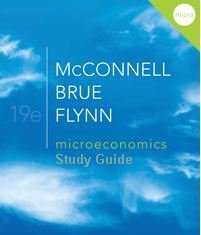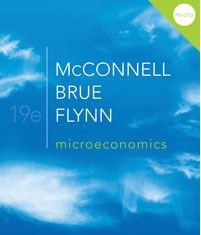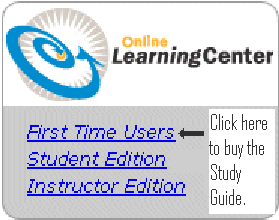TWO SECTIONS
These web pages will be used by two different
class sections: ECO 211-007 (Tuesday/Thursday, 9:30,
J-253) and ECO 211-008 (Tuesday/Thursday, 11:00, J-251)
GENERAL INFORMATION
COURSE DESCRIPTION
This course will cover the area of economics
commonly defined as microeconomics which is
concerned with the individual parts of the economy such
as individual businesses or industries, individual
consumers, and individual products. Our goal is to study
whether the economy uses our limited resources to obtain
the maximum satisfaction possible for society. We will
concentrate on three issues or goals: ALLOCATIVE
EFFICIENCY, PRODUCTIVE EFFICIENCY, and EQUITY, or
"efficiency, efficiency, and equity".
COURSE STRUCTURE
In recent years nearly 40% of students who have
enrolled in an ECO 211 course at Harper College (all
sections, all instructors) have not successfully
completed the course. This means that 40% either dropped
the course or received a grade of D or F. This is
unacceptable. We need to do something different to
improve the success rate.
I plan to do the following:
- Online video lectures and textbook readings will
be assigned for each day that we have class. Students
must complete these BEFORE coming to class. [See:
Assignments]
- A 10 question quiz worth 2 points based on the
reading and video will be assigned for each day of
class. These can be taken as many times as necessary
ansd only the hight score will count. Students must
complete these on Blackboard before class. At 8:00 on
the day of the class the quizzes will no longer be
available.
- Class time will be used to study the
material.
- Students will be tested on the material in
the video lectures, textbook readings.
- Review material will be assigned for students to
improve their understanding of the material outside of
class
The basic structure then will be:
- BEFORE CLASS: Students have their first contact
with the material by watching the video lectures,
reading the textbook, and doing a short daily
quiz.
- DURING CLASS: Class time is used for
questions, discussions, applications, collaboration,
and assessment.
- AFTER CLASS: Review activities to assure you
understand the material [ Practice
Exercises and Blackboard Required
Activities]
As you can see you will need to:
(1) come to class prepared having already
watched the video lectures and read the textbook,
(2) attend class regularly, and
(3) do out-of-class review activities. If you cannot
do all of these activities you will lose points and
you will not be successful in this class.
MATHEMATICS SKILLS
This course requires students to have basic
skills in mathematics, including the use of graphs. If
your math skills are weak you might consider building
them before taking this course. If you are required to
take MTH 055 and have not yet done so, do not take this
course until you have successfully completed it.
REQUIRED MATERIALS
Brief list:
- Textbook: Microeconomics, by
McConnell, Brue, and Flynn, 19th edition, McGraw-Hill,
2011
- Online Videos: Tomlinson Universal
LearningPath Videos Instant Access Code, 1st
Edition
- Textbook Study Guide: Study Guide For
Microeconomics, McConnell/Brue/Walstad, 19th
edition, McGraw-Hill, 2012
Details:
[The prices below are not guaranteed by your
instructor. They are provided only to give students
information on some of the options available. Students
should verify the information before purchasing.]
|
REQUIRED:

|
Microeconomics, by
McConnell, Brue, and Flynn, 19th edition,
McGraw-Hill, 2011
- Textbooks can be bought or rented at the
Harper College Bookstore (L building)
or online at: http://www.harperstore.com
- buy new for $223 plus sales tax
[Students can sell the book back at
the end of the semeser]
- buy used for $167 plus sales tax
[Students can sell the book back at
the end of the semeser]
- rent for $95 and pay NO sales
tax.
OR
- For various online sources click
HERE.
(TextbookRecycling.com)
- At http://www.coursesmart.com/
the ebook is $76
- At http://www.chegg.com
- buy - was $96
- rent - was $29
- ebook $72
|
|
RECOMMENDED:

|
Study Guide For
Microeconomics, McConnell/Brue/Walstad,
19th edition, McGraw-Hill, 2012
(978-0-077338-00-8)
- The Study Guide is available in an
online version for only $15:
OR
- The printed version of the Study Guide
can be bought at the Harper College
Bookstore (or elsewhere) or online at:
http://www.harperstore.com
- ISBN 978-0-077338-00-8
- Cost about $63 new, $29 used, plus
tax
|
|
REQUIRED:

|
Tomlinson Universal LearningPath Videos
Instant Access Code, 1st Edition
- PRICE: about $37.00 for 365 days of
access
- TO BUY:
- Go to: www.cengagebrain.com
- Search for ISBN:
978-0-324-58136-2

- you will create an account and
purchase access to the videos with a
credit card
- once purchased click on "My Home"
to access videos or see below.
- TO ACCESS THE VIDEOS LATER:
- Videos are usually between 5 and 10
minutes long and there usually between 5 and
10 per chapter. Also, most of them have a
written transcript available and a
multiple choice review quiz. These video
lectures are listed on our ASSIGNMENTS
page with their numbers (eg. 2.1-1, 2.1-2,
2.2-1, etc.). Other videos are free online.
Most of the the Tomlinson videos have lecture
notes, a written transcript, and a
multiple choice review quiz
available.
|
BLACKBOARD
All students in ECO 211-007 and ECO 211-008
will use the same Blackboard site: "ECO211 007 008 -
MICROECONOMICS (Fall 2013)"
All students must log-in to our Blackboard website,
study the syllabus, and take the required 5-point,
online, "Syllabus Quiz" before 11:59 p.m., Tuesday,
September 3. The syllabus quiz may be taken as many times
as necessary and only the highest score will be
counted.
Blackboard Instructions:
 Always use the the Firefox browser when using
Blackboard (download for free at: http://www.mozilla.org/en-US/)
Always use the the Firefox browser when using
Blackboard (download for free at: http://www.mozilla.org/en-US/)- Go to http://harper.blackboard.com
- Follow the instructions to "log-in",
- You should see "ECO211-007 008 - MICROECONOMICS
(Fall 2013)" in the "My Courses" box. If you do not
please e-mail the instructor:
mhealy@harpercollege.edu
Links on Blackboard:
BEFORE CLASS
- ASSIGNMENTS:
This is where you see what you have to do for
each day of class. This link has the exact
video lectures and reading assignments that are to
be completed each day before class.
Remember: GET AHEAD!
- PRE-QUIZ: must be completed before class
every day
- VIDEO
LECTURE NOTES has your instructor's notes that
he took when he watched the videos. It compares the
vocabulary used in the videos with the vocabulary
used in the textbook and exams.
- CENGAGE
LOGIN is a link to the Tomlinson video lectures
that you must purchase online. Assigned video
lectures are listed on the ASSIGNMENTS
page with a numbering system that looks like:
1.1-1, 1.1-2, 2.1-1, etc.
AFTER CLASS
- REQUIRED ACTIVITIES: this is where you access
the Required Activity quizzes that must be
taken after every chapter.
- PRACTICE
ACTIVITIES lists the optional review activities
that students should be doing to prepare for the
exams including Study Guide problems, textbook
end-of-chapter questions, and textbook website
activities. Answers are provided for all of the
practice activities.
- TEXTBOOK SOLUTIONS has the answers to the
textbook end-of-chapter questions practice
activities
E-MAIL
Option to Forward Mail from your Harper
E-mail Account
You should always use your Harper email
account when e-mailing your instructor. All e-mails
from harper will be sent to your Harper e-mail
account. If you do not check your Harper e-mail
account often, you can find instructions on how to
forward e-mail from that account to one you check
frequently by logging in to the Harper Student Portal
and clicking on the "My Harper E-Mail" tab. All
correspondence in this class will be sent to your
Harper e-mail account.
When e-mailing your instructor always put "ECO
211" and a message in the subject line. Please use
proper spelling, punctuation, and grammar.
TEXTBOOK WEBSITE
Click on TEXTBOOK
WEBSITE, then select a chapter from the "Choose One"
drop-down menu.
BLACKBOARD DISCUSSION BOARD
- Use the Blackboard Discussion Board for any question
which might be of use to you AND to other students - like
asking a question in class. Do not ask such questions via
e-mail. If you use the Discussion Board everyone can
"hear" the answer.
- To ask a question or leave a comment, go to the
course Blackboard
site and click on the "Discussion Board" link.
Then click on "STUDENT QUESTIONS".
- Since we do not use the Discussion Board a lot, it
is strongly suggested that you SUBSCRIBE to the
discussion board thread so that you get an e-mail
whenever a new message is posted. Just click on the
"Discussion Board" link, click on "STUDENT QUESTIONS",
then click on the "Subscribe" button.
GRADING
The final grade for the class will be awarded
according to the following point system. Changes may
be made to this grading policy. All changes will be
announced in class, posted on the class Blackboard page,
and an email will be sent to all students.
|
Activity
|
Number
|
Total Points
|
Approximate % of total points
|
|
|
Syllabus quiz *
|
1 @ 5 points =
|
5
|
1.5 %
|
|
|
Pre-Quizzes
|
25 @ 2 points each =
|
50
|
15.5 %
|
|
|
Required Review Activities *
|
14 @ 2 points each =
|
28
|
9 %
|
|
|
Papers *
|
4 @ 10 points each =
|
40
|
12 %
|
|
|
Unit exams **
|
3 @ 40 points each =
|
120
|
37%
|
|
|
Comprehensive Final Exam
|
1 @ 80 points each =
|
80
|
25 %
|
|
|
|
TOTAL:
|
323
|
|
|
* Can be redone as many times as necessary
** Each of the three unit exams will also have an
extra credit essay question worth about 3 points
Letter grades will be awarded as follows:
100-90%=A, 89-80%=B, 79-70%=C, 69-60%=D, below
60%=F
Syllabus Quiz (5 points): The syllabus
quiz will be taken online via our class Blackboard site.
It can be taken as many times as you wish before 11:59
p.m., Tuesday, 9/3.and only the highest score will
count.
Class Quizzes and Activities (2 points each day
of class): At the end of each class a short quiz will be
taken on the assigned video lectures and textbook
readings.
Required Review Activity (2 points for each
chapter): The "Required Activities" are to be taken on
Blackboard after we have competed each chapter. They
usually consist of about 20 multiple choice questions.
They can be taken as many times as you wish and only the
highest score will count.
Papers (4 at 10 points each) Papers can be
rewritten for full credit only if they are turned in by
the due dates. Papers turned in late cannot be rewritten.
Please note that papers are either graded as an "A" or an
"F", so the chance to rewrite the paper is important. A
final due date for all papers and rewrites will be
announced in class. For more information see papers
Unit Exams (40 points each): There will be
three in-class unit exams consisting of 40 multiple
choice questions and a three point extra credit essay
question. The exams are NOT open book, NOT open notes,
and you can NOT bring in a sheet of notes or
formulas.
Comprehensive Final Exam (80 points): A final
exam consisting of 80 multiple choice questions will be
given during final exam week.
MAKE-UP POLICY
Class Quizzes and Activities:
Class quizzes and activities are worth 2
points a day (total 50 points or approximately 15% of
the total grade. You must come to class every day and
come prepared. You will be allowed to miss up to 3
days without loss of points. In other words, the first
three days that you miss you will still receive the
two points for the class activities for that day. You
will receive no points for the class activities for
days missed after the first three. There are no
make-ups for these daily activities.
Exams:
Students will be allowed to take an exam at a
time other than the scheduled class period only IF:
1. the instructor is notified
BEFORE the scheduled exam time AND
2. the student has a very good reason to miss the
exam at the scheduled time.
BRIEF COURSE OUTLINE
IMPORTANT: For exact reading assignments see:
ASSIGNMENTS
Unit 1: An Introduction To Economics, Efficiency, and
the Market System
- Ch. 1 -- Limits, Alternatives, and Choices and the
5 Es
- Ch. 2 -- The Market System: The Market and the 5
Es
- Ch. 3 -- Individual Markets: Demand and Supply and
the 5 Es
- Ch. 5 -- Market Failure and the Role of
Government
Unit 2: Consumer Decisions and the Costs of
Production
- Ch. 4 -- Elasticity: Deciding How Much
- Ch. 6 -- Consumer Behavior and Utility
Maximization: Consumer Decisions
- Ch. 7 -- The Costs of Production: Producer
Decisions / Costs
Unit 3: Product Markets: Decision Making and
Efficiency
- Ch. 8 and 9 -- Pure Competition
- Ch. 10 and 18 -- Pure Monopoly and Regulation
- Ch. 11 -- Monopolistic Competition and
Oligopoly
Unit 4: Resource Markets: Decision Making, Efficiency,
and Equity
- Ch. 13 -- The Demand for Resources
- Ch. 14 -- Wage Determination
- Ch. 20 -- Income Inequality, Poverty, and
discrimination
- Ch. 22 -- Immigration
NOTE: This outline may be changed! Changes will be
announced in class.
ATTENDANCE POLICY
There will be in-class activities worth two
points each day (about 50 points total or about 15% of
your total score) so class attendance is very important.
You will be allowed to miss up to 3 days without loss of
points. In other words, the first three days that you
miss you will still receive the two points for the class
activities for that day.
LIBRARY RESERVE
A textbook and a study guide have been placed on
reserve in the library in case you misplace yours or
leave at Grandma's house. They can be checked out from
the circulation desk for two days at a time.
HOW TO PASS ECONOMICS
The following suggestions should help you learn
economics:
- This is a difficult course! There is an old rule
of thumb concerning studying for college courses: on
average students should study TWO hours for every ONE
hour of class. Since this is a 3 credit-hour course
you should plan to study microeconomics 6 hours per
week. This is an average, which means some courses
require more study time and some less. You may find
that economics requires more.
- GET AHEAD!. There will be assignments for each day
of class. You should try to be at least one to two
days (one week) ahead. See the ASSIGNMENTS.
- View the video lectures, read the assigned
readings, and do the daily Pre-Quizzes BEFORE
class.
- Passive reading of the textbook is not very
helpful. Read with a pen in your hand and a notebook
on which to list, repeat, copy, calculate, etc. ALSO,
pay close attention to the TABLES and GRAPHS. THEY
ARE IMPORTANT. For most of the video lectures there
is
- Passive watching of the video lectures is not very
helpful either. Most of the Tomlinson videos have an
online review quiz, transcripts, and lecture notes.
Use them. Also, I have watched each of the assigned
video lectures and taken my own notes. They are
available at Video
Lecture Notes and on outr Blackboard site.
- Come to class each day and come prepared to work.
You will get a lot of your studying done during class.
- don't be late.
- NO CELL PHONES
- After class, do review problems until you feel you
know the material well. First complete any Yellow
Pages that we didn't do in class. Then see the
Practice
Exercises web page which lists problems from the
textbook, study guide, and textbook website that you
are responsible for in each unit. If you can't do
these problems you will do poorly on the quizzes and
exams. The Required Activity review quizzes on
Blackboard are "required" and worth 2 points each.
- See the instructor for assistance. This should be
done EARLY in the semester. The Tutoring Center also
offers help. Or, or ask questions in class and on the
Blackboard Discussion Board
- Try to APPLY the concepts learned in class to the
"real world" including issues in the news and aspects
of your personal life.
- GET AHEAD! You will have almost assignments every
day for class and you will not always have time the
night before, so GET AHEAD in case something comes
up.
"SUPPLEMENTAL INSTRUCTION (SI)" at Harper
College
Supplemental Instruction is a series of weekly
review sessions for students taking historically
difficult courses. SI is provided for all students who
want to improve their understanding of course material
and improve their grades.
Attendance is voluntary. It is a chance to get
together with people in your class to compare notes,
discuss important concepts, to develop strategies for
studying the subject and to test yourself before your
instructor does, so you will be ready. At each session,
you will work with your SI leader, a competent student
who has previously taken the course.
If you attend the sessions regularly, chances are you
will earn a better grade. You will have developed a
better understanding of course content as well as more
effective ways of studying. This will help you in other
classes, too.
SI times will be announced in class and posted on our
Blackboard site.
DAILY SCHEDULE OF
ASSIGNMENTS:
|
August
|
September
|
October
|
November
|
December
|
|
|
|
|
|
|
DUE DATES:
|
|
- Exams:
- Syllabus Quiz, on, or before, Tuesday,
9/3
- Exam 1: Thur., 10/3
- Exam 2: Tue., 10/29
- Exam 3: Tue., 11/26
- Final Exam:
- ECO 211-007 9:30 class: Tuesday,
12/17, 9:55-11:40
- ECO 211-008 11:00 class: Tuesday,
12/17, 11:50-1:35
|
|





 Always use the the Firefox browser when using
Blackboard (download for free at:
Always use the the Firefox browser when using
Blackboard (download for free at: